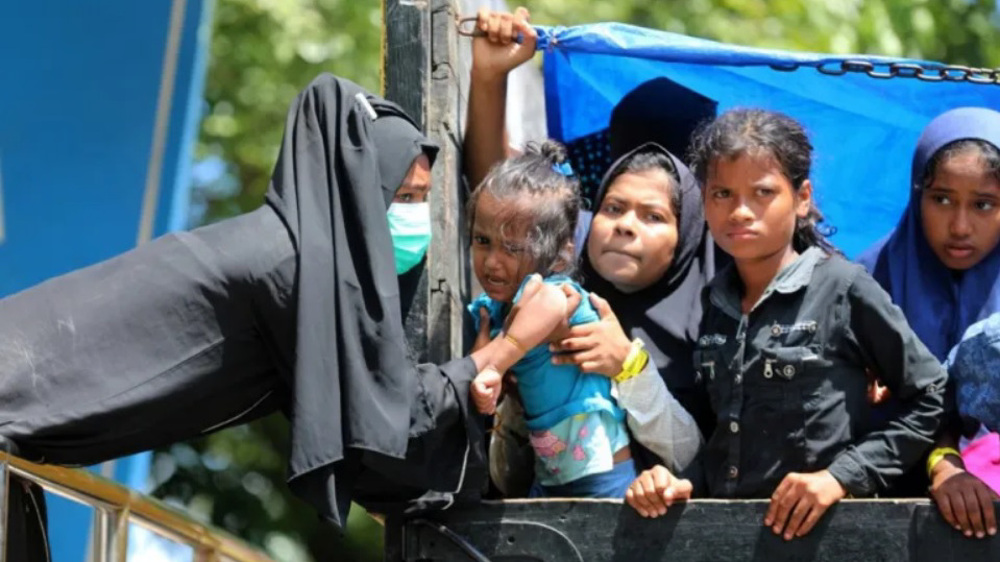European Parl. excludes Suu Kyi from Sakharov Prize community for crimes against Rohingya
The European Parliament has formally removed Myanmar's de facto leader Aung San Suu Kyi from the "Sakharov Prize community" because of her "acceptance" of state-sponsored crimes against the persecuted Rohingya community in Rakhine state.
In a statement released on Thursday, members of the European Parliament (MEPs) said the decision was a response to Suu Kyi's "failure to act and her acceptance of the ongoing crimes against the Rohingya community in Myanmar".
"The Sakharov Prize Community connects MEPs, laureates, and civil society to increase cooperation on human rights action in Brussels and internationally," the parliament said, confirming the 75-year-old had been "formally suspended" from all laureate activities.
A source close to the EP said the prize had been awarded for Suu Kyi's work before 1990 and could not be withdrawn but the exclusion was the strongest sanction available to the chamber.
In May, the City of London Corporation (CLC) revoked an honor granted to Suu Kyi over the treatment of minority Rohingya Muslims.
Elected representatives on the body voted to revoke the Freedom of the City of London granted to Suu Kyi three years ago.
The move followed Suu Kyi's appearance at the International Court of Justice (ICJ) in The Hague in December last year to personally defend her country against allegations of rape, arson and mass killings perpetrated by Myanmar troops against Rohingya Muslims.
In her defense, Suu Kyi described the conflict as an internal one and said if human rights violations had occurred, they did not rise to the level of genocide.
In January the ICJ ordered Myanmar to prevent the genocide of Rohingya Muslims in Rakhine. Suu Kyi's 's government rejected the ruling, saying it was based on a "distorted picture of the situation".
Lawyers seeking to halt an ongoing genocide against Rohingya at the time strongly denounced Suu Kyi’s silence in the face of genocide accusations and her defense of the country’s armed forces, saying the fallen pro-democracy icon chose to ignore “unspeakable” acts committed against Muslims.
The hearings had seen the astonishing spectacle of the 1991 Nobel Peace Prize laureate defending the very army that kept her under house arrest for some 15 years.
In November 2018, Amnesty International stripped Suu Kyi of its most prestigious human rights prize over her failure to decry violence against the Rohingya Muslim minority.
The UK-based human rights group said Suu Kyi had "shielded the security forces from accountability" for the violence against the Rohingya, describing it a "shameful betrayal of the values she once stood for".
"We are profoundly dismayed that you no longer represent a symbol of hope, courage, and the undying defense of human rights," Amnesty's Secretary General Kumi Naidoo wrote in a letter to the Myanmar leader.
"[Your] denial of the gravity and scale of the atrocities means there is little prospect of the situation improving," Naidoo said.
The group had named Suu Kyi as its 2009 Ambassador of Conscience Award recipient when she was still under house arrest for her opposition to Myanmar's oppressive military junta.
She became a pariah in world capitals, especially after she traveled to the ICJ to rebut allegations against her country of rape, arson and mass killings.
Suu Kyi has been accused of turning a blind eye to, or even condoning, abuses against the Rohingya.
Around 740,000 Rohingya fled to neighboring Bangladesh after a bloody crackdown in 2017 by the Myanmar military, which UN investigators have concluded was carried out with "genocidal intent".
Thousands of Rohingya Muslims remain in Myanmar, living under apartheid-like conditions, confined to camps and villages and denied access to healthcare and education.
The Rohingya have inhabited Rakhine for centuries, but the state denies them citizenship. Bangladesh refuses to grant them citizenship, too.
VIDEO | Press TV's news headlines
VIDEO | 'War on Iran is only just beginning' ft. Laith Marouf
VIDEO | Gaza’s economy collapses due to Israeli war
VIDEO | Israel rejects US-approved Gaza technocratic committee
‘Narcissistic psychopath’: Netizens mock Trump over letter to Norway PM on Nobel Prize
Israeli forces demolish UNRWA buildings in occupied East al-Quds
Trump lashes out at allies over Greenland, shares private texts online
Iran’s Armed Forces will cut off any 'hand of aggression' against Leader: Spokesman














 This makes it easy to access the Press TV website
This makes it easy to access the Press TV website